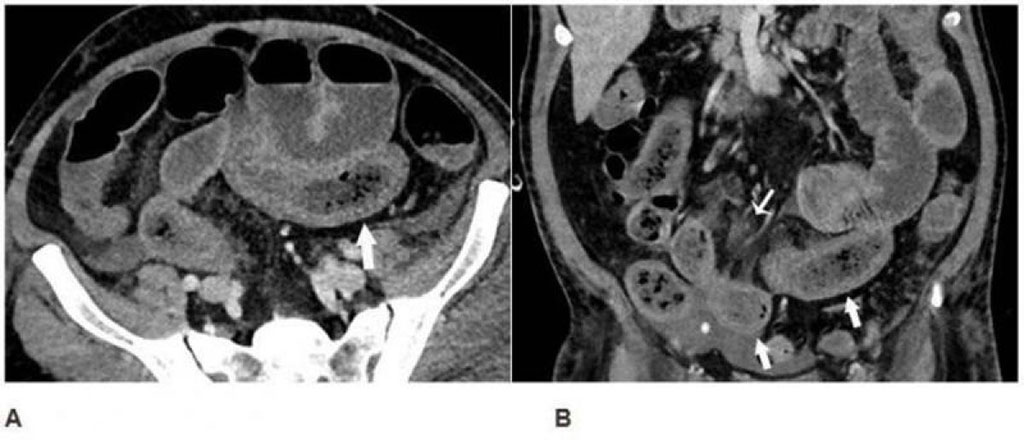Imaging Reveals Bowel Abnormalities in COVID-19 Patients
By MedImaging International staff writers
Posted on 03 Jun 2020
A new study suggests that patients with COVID-19 can have bowel abnormalities, including ischemia, possibly due to small vessel thrombosis. Posted on 03 Jun 2020
Researchers at Massachusetts General Hospital (MGH; Boston, USA) and Harvard Medical School (HMS; Boston, MA, USA) conducted a retrospective cross-sectional study that included 412 patients (average age 57 years; 241 men) who had tested positive for severe acute respiratory syndrome coronavirus 2 (SARS-CoV-2). The medical records of the patients were reviewed for clinical data, which showed that 17% had undergone cross-sectional abdominal imaging, including 44 ultrasounds, 42 computed tomography (CT) scans, and one magnetic resonance imaging (MRI).

Image: Axial (A) and coronal (B) CT of the abdomen suggestive of early ischemia (Photo courtesy of RSNA)
The results revealed that abdominal imaging was associated with age and ICU admission. Abnormal bowel findings were seen in 31% of the CT scans (3.2% of all patients). The bowel findings included thickening and signs of ischemia, such as pneumatosis (gas in the bowel wall) and portal venous gas. Surgical correlation in four patients revealed unusual yellow discoloration of the bowel in three of the patients, and bowel infarction (dead bowel) in two patients, in which pathology demonstrated ischemic enteritis with patchy necrosis and fibrin thrombi in the arterioles.
Of the right upper quadrant ultrasounds, 87% were performed for liver laboratory findings, and 54% demonstrated a dilated, sludge-filled gallbladder, suggestive of cholestasis. Four patients who had a cholecystostomy tube placed had negative bacterial cultures. The researchers added that Angiotensin converting enzyme 2 (ACE2), a target of SARS-CoV-2, demonstrates its highest surface expression in the lung, small bowel, and vasculature, suggesting abdominal viscera may be susceptible to injury. The study was published on May 11, 2020, in Radiology.
“We found bowel abnormalities on imaging in patients with COVID-19, more commonly in sicker patients who went to the ICU. Some findings were typical of bowel ischemia, or dying bowel, and in those who had surgery we saw small vessel clots beside areas of dead bowel,” said lead author Rajesh Bhayana, MD, of the MGH department of radiology. “Patients in the ICU can have bowel ischemia for other reasons, but we know COVID-19 can lead to clotting and small vessel injury, so bowel might also be affected by this.”
Related Links:
Massachusetts General Hospital
Harvard Medical School














